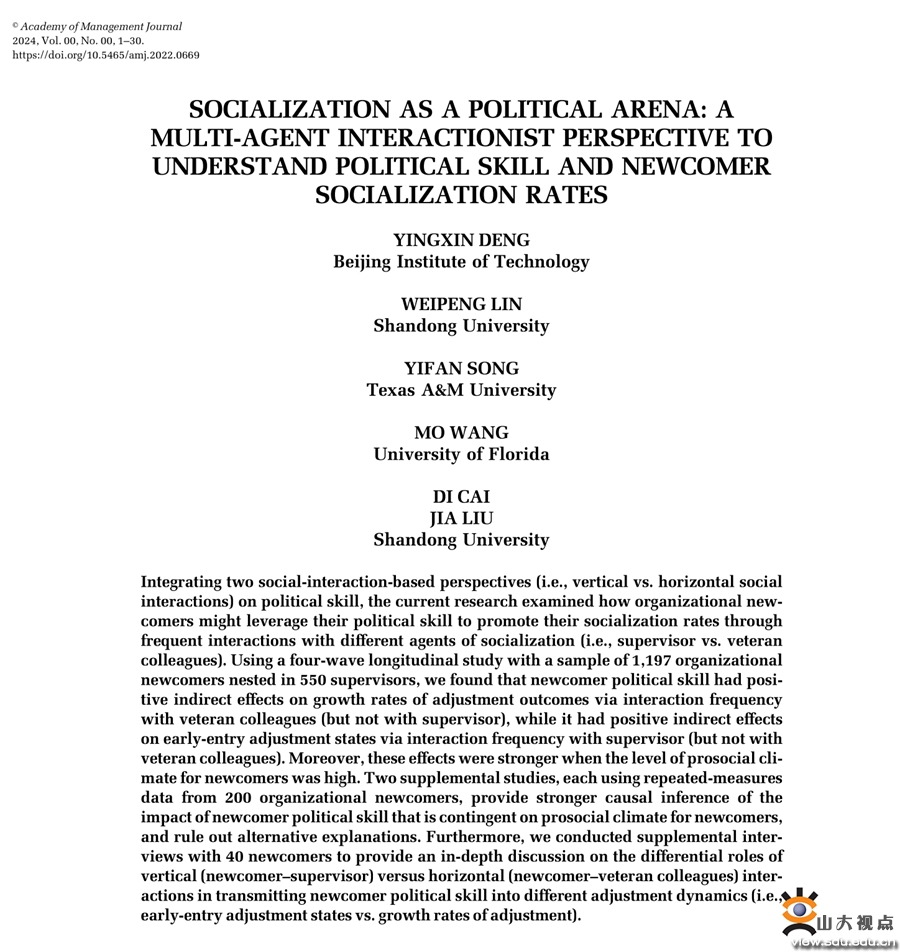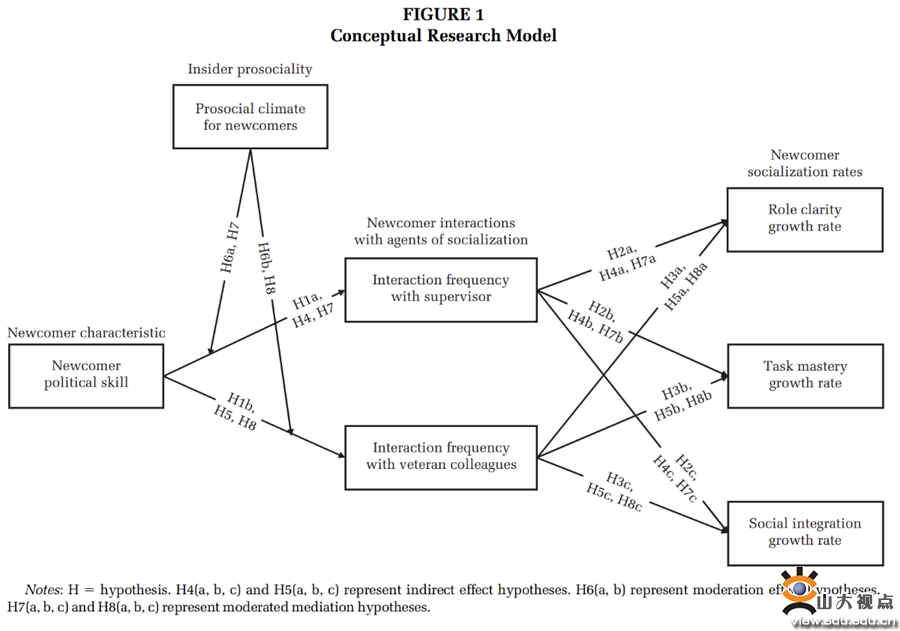Recently, Professor Lin Weipeng, Professor Cai Di and doctoral student Liu Jia from the School of Management, Shandong University, published their latest research results "Socialization as a political arena: A multi-agent interactionist perspective to understand political skill and newcomer socialization rates" in Academy of Management Journal, the top international journal of management. Deng Yingxin, Assistant Professor at Beijing Institute of Technology, and Professor Lin are the co-first authors of the paper, and Professor Lin and Professor Cai are the co-corresponding authors, while the co-authors of the paper include Song Yifan, Assistant Professor of Texas A&M University, Wang Mo, Professor of the University of Florida, and Liu Jia. Shandong University was the first and only corresponding author affiliation, and the research was funded by the National Natural Science Foundation of China.

Organizations are usually composed of people with different backgrounds and interests. In organizations, personal achievement and career success depend not only on diligence and intelligence but also on interpersonal acumen and shrewdness. It suggests that organizational life is a political arena and that employees need to possess good political skills (the ability to accurately interpret and effectively influence others in an organizational setting) to be more likely to achieve career success. In the field of political skills research, interactions with superiors ("vertical interpersonal interaction") or coworkers ("horizontal interpersonal interaction") are the key mechanisms through which employees' political skills play a positive role (e.g., contribute to career success). However, previous research has tended to focus on one of the two interpersonal interaction mechanisms at the expense of the other, which has led to a lack of consensus on theoretical issues related to how political skills work through different mechanisms and thus produce different outcomes.
Focusing on the context of newcomer socialization (the adaptive process of newcomers understanding their roles, acquiring core skills, and integrating into the organization), the study views socialization as a political arena for newcomers, and by integrating two perspectives of interpersonal interaction ("vertical interpersonal interaction" and "horizontal interpersonal interaction"), the study explores how newcomers use their political skills to interact frequently with different members of the organization (superiors vs. veteran colleagues) in order to accelerate their socialization processes. Specifically, the study intends to help address the theoretical issues mentioned above and create a new theoretical consensus by exploring the different impact effects of vertical and horizontal interpersonal interaction mechanisms in the context of newcomer socialization (see Figure 1 for the theoretical model).

Results from a four-stage, large-sample longitudinal study and two two-stage, repeated-measures supplemental studies suggest that newcomers with high levels of political skills are able to have the interaction frequency with superiors and veteran colleagues, but that interactions with different targets produce different effects: the interaction frequency with superiors enable newcomers to achieve a higher level of adaptation at the beginning of the onboarding period (but the sustainable upgrading of the adaptation may not always be realized), while the interaction frequency with veteran colleagues enable newcomers to achieve a higher level of adaptation (but the promotion of the adaptation at the beginning of the onboarding period may not always be realized). In addition, the organization's prosocial climate for newcomers enhances the above mediating effects. In order to shed more light on the nature of the managerial phenomenon, the study conducted additional interviews with newcomers, which helped to construct an intrinsic theoretical mechanism by which frequent interpersonal interactions with different targets (superiors vs. veteran colleagues), in which newcomers utilize their political skills, differentially affect the outcome of socialization dynamics.
The study not only identified the unique explanatory value of each interpersonal interaction mechanism but also helped to reconcile different theoretical perspectives on how political skills work in previous studies. At the same time, by exploring the different nature and effects of "vertical interpersonal interaction" and "horizontal interpersonal interaction," the study provides new theoretical explanations for how political skills can achieve interpersonal impact and how newcomers can achieve rapid socialization. In addition, the findings of the study can provide practical insights into the development of newcomer adaptation and training, as well as the creation of a positive and healthy culture in organizations.
Academy of Management Journal, the flagship journal of the American Management Association, one of TAMUGA's top 8 journals (a list of top journals in the field of management jointly selected by Texas A&M University and the University of Georgia, the world's leading public research universities), FT-50 Journal (the world's top 50 journals in the field of business, selected by Financial Times), ABS/AJG-4* Journals (a guide to high-quality academic journals published by the Chartered Association of Business Schools, with 4* being the top journals), and UTD-24 Journals (24 top business journals developed internally by the University of Texas at Dallas).
Lin Weipeng is a professor in the Department of Leadership and Organizational Management, School of Management, Shandong University, a National Young Talent, a distinguished professor of TaiShan Scholars, a Qilu Young Scholar, and a consultant editor/editorial board member of the Journal of Applied Psychology. His main research areas include occupational health, organizational politics, work stress and coping, and leadership. His research results have been published in the Academy of Management Journal, Journal of Applied Psychology, Journal of Management, Personnel Psychology, and other top international management journals.
Cai Di is a professor in the Department of Leadership and Organizational Management, School of Management, Shandong University, and a Qilu Young Scholar. His main research areas include leadership, socialization, initiative, team management, and organizational management innovation. His research results have been published in the Academy of Management Journal, Journal of Applied Psychology, Journal of Occupational and Organizational Psychology, and other top international management journals.
Liu Jia is a doctoral student in the Department of Leadership and Organizational Management, School of Management, Shandong University. Her main research areas include socialization, political skills, and team climate. Her research results have been published in the Academy of Management Journal, Computers in Human Behavior, Journal of Managerial Psychology, and other journals.